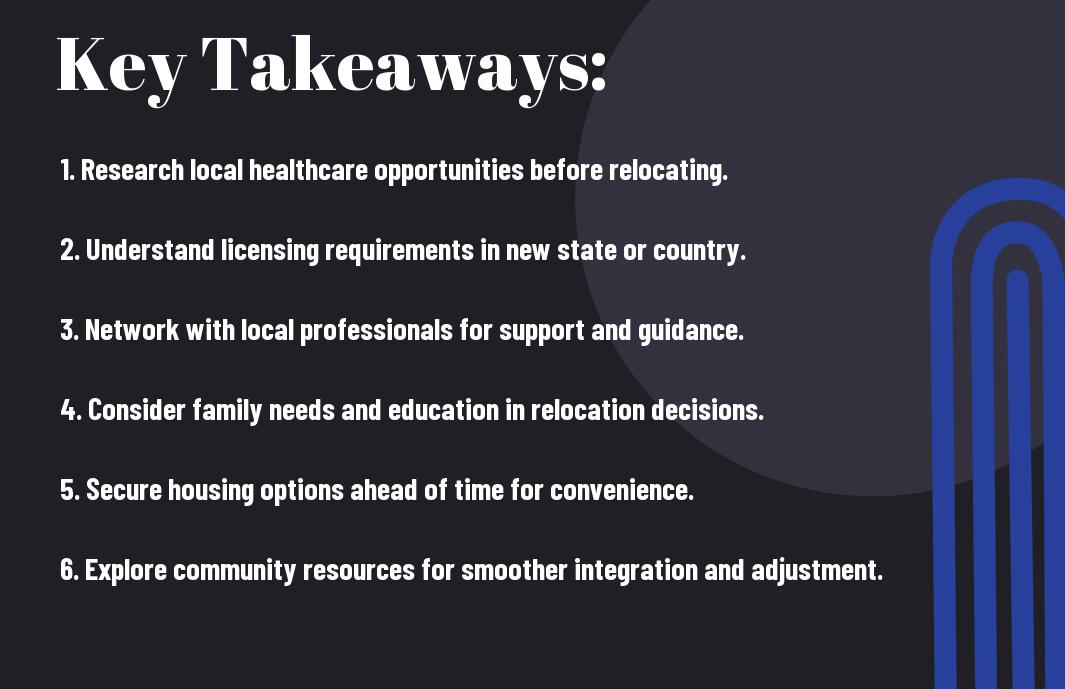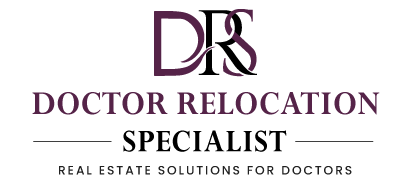There’s a wealth of considerations to navigate when you’re planning a move as a medical professional. From understanding licensure requirements to evaluating potential job opportunities, each step can bring challenges that affect both your career and personal life. As you prepare for this significant transition, it’s vital to be informed about the key factors that will ease your move and help you thrive in a new environment. This guide will provide you with valuable insights and strategies to successfully manage your relocation journey.
Understanding the Relocation Process
The relocation process for medical professionals can be complex and multifaceted. As a doctor, you will need to navigate various logistical and emotional challenges, from securing a new job to moving your family. Understanding the steps involved in this process is imperative to ensure a smooth transition to your new practice and location. This may include researching potential employers, completing necessary licensing requirements, and organizing your personal affairs to facilitate your move. Each aspect plays a significant role in setting the foundation for your future career and life in the new location.
Assessing Your Reasons for Relocation
The first step in your relocation journey is to evaluate your motivations for making the move. Reasons may vary from seeking better career opportunities, desiring a change in lifestyle, or needing to be closer to family. By assessing your reasons, you can establish clear priorities that will guide you through the rest of the relocation process. Understanding what is driving your decision will not only help you make informed choices but also bring clarity to your goals as you launch on this significant change.
Key Considerations in Choosing a New Location
By selecting your new location thoughtfully, you will enhance both your career satisfaction and personal well-being. It’s important to take into account factors such as job availability, cost of living, work-life balance, and community resources, all of which will play significant roles in your overall happiness. Additionally, consider the local healthcare landscape, including the demand for your specialty and the reputation of hospitals or clinics in the area. Evaluating these elements will enable you to make a well-rounded decision that aligns with your aspirations and lifestyle needs.
Your choice of location can significantly impact your professional and personal life. Start by researching cities or regions where your specialized skills are in demand and where healthcare facilities have a solid reputation. Assess the local amenities and quality of life, such as schools, recreational areas, and healthcare accessibility. You may even want to visit potential locations to gauge whether they align with your expectations. Weighing these critical points against your ambitions and family needs will empower you to choose a location that best suits you.
Licensing and Certification Requirements
Clearly, understanding licensing and certification requirements is crucial for your successful transition as a medical professional relocating to a new state. Each state has its own regulations governing the practice of medicine, which often includes specific requirements for licensure, continuing education, and various specialized certifications. You will need to familiarize yourself with the medical board of your new state to ensure you meet all necessary criteria, which can involve various paperwork, fees, and sometimes even examinations. Getting this sorted out early in your relocation process can save you a considerable amount of time and stress later on, enabling you to focus on settling into your new practice environment.
Navigating State-Specific Medical Licenses
By relocating to a new state, you are crucially starting a new chapter in your medical career, which often begins with obtaining a state-specific medical license. Each state has its own application processes and requirements, so it is imperative to conduct thorough research on what is needed in your new location. This can include submitting proof of education and training, undergoing background checks, and possibly meeting additional conditions unique to that state. It may also benefit you to consider applying for a temporary or expedited license if available, as this can allow you to start working while you navigate the full licensure process.
Understanding Credentialing with Insurance Providers
Among the complexities of relocating as a medical professional, understanding credentialing with insurance providers is another key challenge to navigate. Credentialing is the process by which healthcare organizations and insurance companies verify your qualifications and assess your competence. This can frequently involve submitting your licenses, board certifications, work history, and more, creating a comprehensive profile required for participation in health plans. Since each insurer may have different requirements, you need to be proactive in gathering and submitting the appropriate documentation to avoid delays, especially since credentialing can take several months.
With that in mind, it is wise to reach out to the insurers you plan to work with as soon as possible to clarify their specific credentialing processes. It may help to create a checklist based on the requirements of each insurance provider you intend to contract with, which will facilitate a smoother credentialing experience. Additionally, keeping an open line of communication with your new employer about their preferred insurers and any assistance they can provide during the credentialing process could prove beneficial. The more prepared you are, the easier it will become to navigate the insurance landscape in your new state, ensuring that you can start seeing patients without unnecessary delays.
Handling Logistical Challenges
It is often said that the success of your relocation as a medical professional hinges on how well you navigate the logistical challenges that come with it. The relocation process can be daunting, involving numerous tasks, from finding a suitable home to understanding the financial implications of your move. By breaking down these processes and leveraging the right resources, you can ease the burden that often accompanies such transitions.
Finding a Suitable Home and Community
One of the first hurdles you might face is finding a suitable home that meets both your personal and professional needs. As you consider potential locations, take the time to research various neighborhoods that reflect your lifestyle preferences. Factors to consider include proximity to your workplace, access to high-quality schools if you have children, and available amenities such as hospitals, parks, and shopping areas. Engaging a local real estate agent who understands the nuances of the area can also streamline your search and help you secure a home that meets your expectations.
Managing Financial Implications of Relocation
An important aspect of your relocation involves managing the financial implications that come along with it. As you transition to a new position, expenses related to the move, such as hiring movers, temporary housing, and travel costs, can quickly add up. Familiarize yourself with potential relocation assistance programs that your new employer may offer, which can alleviate some of the financial burdens you anticipate. Additionally, it’s advisable to create a comprehensive budget to account for both immediate moving expenses and ongoing cost-of-living adjustments in your new city.
A well-thought-out relocation plan can be enhanced by consulting with a financial advisor who specializes in assisting medical professionals. This expert can help you evaluate your current financial situation and offer tailored strategies to mitigate any financial strain. Their support will provide clarity on long-term investments, retirement planning, and tax implications of your move. Keeping your finances organized and understanding all aspects of your financial landscape is key to not only surviving but thriving during your transition.

Integrating into a New Medical Community
For medical professionals, moving to a new location presents both challenges and opportunities to forge meaningful connections within a new medical community. Successfully integrating into this community entails understanding not just the local healthcare landscape, but also the people who comprise it. This means actively engaging with colleagues, participating in community events, and fostering professional relationships that extend beyond the walls of the hospital or clinic. It is necessary to position yourself not just as a practitioner, but as a valued member of the community, which often leads to collaborative opportunities and professional growth.
Building Professional Networks
Behind every successful medical practice is a robust network of colleagues and collaborators. Building professional networks in a new environment starts with proactive outreach. Connect with fellow healthcare professionals through local medical associations, attending conferences, or by participating in workshops. Utilize social media platforms to find groups focused on your specialties and interests. Keep in mind, networking is a two-way street; offer support and resources to your peers to foster reciprocal relationships that enhance your integration into the community.
Adapting to Different Workplace Cultures
Integrating into a new workplace culture requires you to be observant and adaptive. Each medical institution has its own established norms, communication styles, and operational procedures. To acclimate, take the time to observe how your new colleagues interact with each other and with patients. This will give you insight into the values that the institution holds dear and help you align your practices accordingly. Don’t hesitate to ask questions or seek mentorship from those who have been in the community longer. Building strong relationships early on can ease your transition and enhance job satisfaction.
The ability to adapt to different workplace cultures can significantly influence your success in a new medical community. Embracing the values and work ethic of your new colleagues will not only help you professionally but will also facilitate smoother relationships with patients and their families. With every interaction, strive to display an openness to learning and a willingness to integrate your unique skills into the established framework. This balanced approach can pave the way for lasting connections that enrich both your professional life and personal experience in your new location.

Addressing Personal and Family Considerations
Now that you’ve made the decision to relocate as a medical professional, it’s imperative to evaluate the personal and family adjustments necessary for a smooth transition. The impact on your family life can be significant, and supporting your loved ones through this change requires attention and empathy. Open communication is key; talk with your family about the relocation, encouraging them to express their feelings and concerns. You might need to consider their needs regarding school changes, friendships, and adapting to new surroundings. Additionally, researching local amenities, recreational facilities, and community engagement opportunities can help ease their transition and promote a sense of belonging in the new environment.
Supporting Family Transitions
Behind every successful move is a solid support system within the family unit. Acknowledge that the relocation affects each member differently. You can facilitate the process by involving them in decision-making—let them participate in choosing schools, exploring neighborhoods, or identifying local attractions they would be excited about. By creating shared experiences and opportunities for bonding, you foster a supportive atmosphere that helps everyone adjust more comfortably to the changes ahead.
Balancing Work-Life Dynamics
Transitions such as moving to a different location for work can often blur the lines between your professional and personal life. You are likely to face new demands at your workplace that may require longer hours or additional responsibilities. It is important to establish boundaries and employ effective time management strategies to maintain a healthy balance. Prioritize your time—evaluate your weekly commitments, set realistic goals, and make room for family time, relaxation, and self-care. You might find it beneficial to schedule specific activities that allow you to unwind and reconnect with your loved ones, reinforcing the bond that is vital as you navigate this new chapter.
And as you strive to achieve this balance, consider the value of flexibility. Flexibility in your work schedule can provide you with opportunities to accommodate family activities or obligations. Utilizing technology to stay connected during late shifts or adjusting your hours to align with family needs can contribute significantly to creating a harmonious atmosphere at home. Ultimately, maintaining a lifestyle that respects both your professional aspirations and your family’s well-being will serve you well during this period of transition.
Resources and Support
Your transition to a new location can be made significantly easier through the utilization of various resources and support systems available to you as a medical professional. These resources not only help you navigate the logistics of relocating but also connect you with other professionals in your field, enabling you to establish a network in your new community. From finding suitable housing to understanding the local healthcare landscape, tapping into these resources can streamline the adjustments that come with relocating.
Utilizing Relocation Services
At this stage, you may want to consider using relocation services to assist with the practical aspects of your move. Many medical facilities and hospitals partner with relocation specialists who can help you find housing, provide orientation about your new city, and ease your family’s transition. These experts can save you time and reduce stress, ensuring that you can focus on your professional responsibilities while they handle the logistics of settling into your new environment.
Joining Professional Associations
One of the best ways to ease into a new location as a medical professional is by joining local professional associations. These organizations not only provide you with valuable networking opportunities but also offer resources, guidance, and continuing education tailored to your specific needs. By becoming a member, you gain access to events, workshops, and forums where you can connect with other healthcare professionals who share similar experiences and challenges.
And as a member of these associations, you may also find mentorship opportunities that can further ease your transition. Engaging with seasoned professionals who have faced similar relocations can provide you with insights and advice that are both practical and relevant to your field. Not only will you gain support for your career development, but you may also develop meaningful relationships that can enrich both your personal and professional life in your new location.

Summing Up
As a reminder, navigating the challenges of doctor relocation requires careful planning and consideration. You must weigh the pros and cons of your move, ensuring that you address all logistical aspects effectively. From securing professional credentials to finding suitable housing and establishing connections within your new community, each step is vital for a smooth transition. By focusing on these key areas, you can mitigate the potential stresses of relocating and position yourself for success in your new role.
Additionally, don’t overlook the importance of establishing a support network as you settle into your new environment. Engaging with local medical communities can provide you with valuable insights and resources that will ease your integration. Take advantage of both professional and personal local networks to enrich your relocation experience. By empowering yourself with knowledge and connections, you will enhance not only your professional journey but also your overall well-being during this significant life change.

